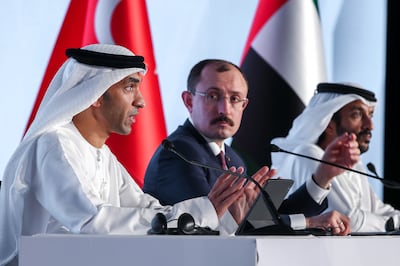The UAE and Turkey signed a comprehensive economic partnership agreement (CEPA) on Friday, to boost trade between the two nations.
This follows similar trade agreements the UAE has concluded with other countries including India, Indonesia and Israel, as the Arab world's second-largest economy moves to develop closer trade and investment relations with key partners around the world.
Dr Thani Al Zeyoudi, Minister of State for Foreign Trade, said in Abu Dhabi that the agreement was a milestone for the region.
"It promises to write a new chapter in the UAE-Turkey bilateral relations, transforming long-standing friendship into a dynamic partnership for growth," he said.
The agreement, which is expected to come into effect from the middle of this year, will create 25,000 highly skilled jobs in the UAE and 100,000 jobs in the Turkish market in the next 10 years, Dr Al Zeyoudi told The National on the sidelines of the event.
Bilateral non-oil trade is expected to surge to more than $40 billion in the next five years from about $18.9 billion currently, he said.
"The focus is going to be on services, including AgriTech, construction, ICT, telecommunications, logistics and pharmaceuticals," he said. "There will be good market access for many of our products when it comes to aluminium and petrochemicals."
The UAE aims to boost trade and economic relations with countries around the globe.
In September 2021, the Emirates announced plans to double the size of its economy to Dh3 trillion ($816.88 billion) by 2030, from Dh1.4 trillion.
The UAE is looking to eliminate or reduce tariffs, remove unnecessary trade barriers, increase market access and set up investment and trade joint-ventures with its partners.
It is working towards signing 26 comprehensive economic partnership agreements as it seeks to attract more investment and diversify its economy.
"We are going to conclude [CEPAs] with Georgia and Cambodia in the coming three to four weeks and we are in good shape with Kenyans as well," Dr Al Zeyoudi said. "There is more to come."
The latest agreement comes as the UAE and Turkey focus on expanding their relationship. Turkish President Recep Tayyip Erdogan made his first official visit to the UAE in almost a decade in February last year.
The two countries signed 13 agreements and protocols in various fields at that time, including defence, health and medical sciences, sea and land transport, advanced industries and technology, climate action and culture. The central banks of the two countries also signed a currency swap agreement.
In 2021, the UAE formed a $10 billion fund to support investments in Turkey following talks between President Sheikh Mohamed and Mr Erdogan.

The investment fund aims to increase support for the Turkish economy and will focus on sectors such as energy, health and food.
The UAE's non-oil foreign trade continues to rise as the country's economy recovers from the coronavirus pandemic on the back of higher oil prices and government initiatives.
In 2022, the Emirates' non-oil foreign trade surged 17 per cent annually to reach a record Dh2.23 trillion ($607.1 billion). This was the first time the UAE’s non-oil foreign trade crossed the Dh2 trillion mark.
China, Asia's largest economy, was the UAE's top trading partner during the period, with bilateral trade between the two countries at Dh264.5 billion. It was followed by India (Dh180.9 billion), Saudi Arabia (Dh135.2 billion) and the US (Dh110 billion).
The UAE economy is estimated to have grown by 7.6 per cent last year, the highest in 11 years, after expanding by 3.9 per cent in 2021, according to the UAE Central Bank.
The country’s economy is projected to grow 3.9 per cent in 2023, according to the central bank.









